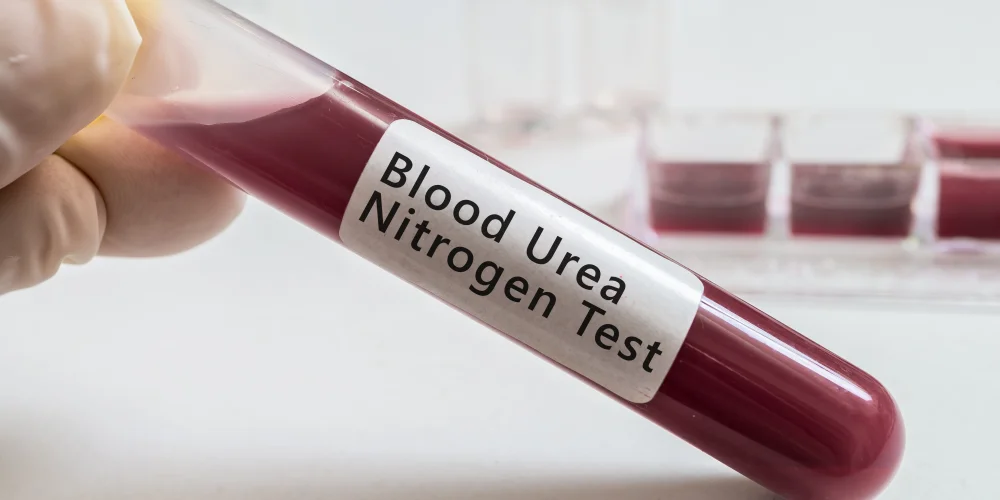BUN / UREA Test
Assess urea levels for kidney health
It is the Bun / Urea test, commonly referred to as the Urea test is an important test that measures the level of urea nitrogen in blood. Urea is a metabolite of waste created in the liver as your body is breaking down proteins. It is excreted out by the kidneys via urine. The BUN test can provide valuable data on kidney function and general well-being.

When is the BUN / Urea Test Prescribed?
The test measures kidney function through assessing how well the kidneys are able to remove urine urea out of the blood. It is vital in determining the presence of conditions, such as acute kidney injuries or chronic kidney disease or the condition of dehydration. In patients who have known kidney issues or undergoing treatment that could impact kidney function, this test plays an important role in assessing kidney health. Furthermore, as an element of regular health checks and especially for people with risk factors such as diabetes, hypertension or heart diseases In addition, the BUN and Urea Test helps assess overall kidney health and facilitates the early identification and treatment of kidney problems that could be a problem.
Preparation for the BUN / Urea Test
A special diet is not typically needed for the BUN or Urea Test. Patients are allowed to take a normal diet and drink before taking the examination. But, it is essential to inform your physician of any medication, supplements or illnesses that have recently occurred in order to impact the test results.
Parameters Considered During BUN / Urea Test
The BUN or Urea Test measures the amount of urea-nitrogen in the blood. It can detect elevated levels indicating a variety of ailments. A decreased kidney function could result in higher urea nitrogen levels. In addition, dehydration could cause urine to concentrate and increase BUN levels. In addition, an increase in protein intake or the breakdown of body proteins could also cause increased BUN levels. This knowledge about kidney function and general well-being are vital for detecting and treating kidney-related ailments effectively.
Time Required for BUN / Urea Test Report
The BUN The BUN Urea Test is a quick process. When a blood sample has been taken and analyzing it, the results can be obtained within one day. The speed of turnaround allows medical professionals to examine kidney function and provide an appropriate course of treatment or another evaluation should it be required.
BUN / Urea Test Price
The Urea Test – Blood Urea Nitrogen (BUN) and Urea Test cost Rs200. This will allow you access to vital diagnostic tests that are essential to monitor kidney health. This affordable option helps in the early identification and treatment of kidney diseases, leading to better outcomes for patients.
Book an Appointment for BUN / Urea Test
Making an appointment to take your BUN/Urea test in the Chirayu SuperSpeciality Hospital is straightforward. It is possible to schedule your test via our online portal or call our team. We’re committed to offering prompt and efficient services to satisfy your health requirements.
What Our Patients Say
Hear from our valued patients about their experiences at Chirayu Super Speciality Hospital and how our care has made a positive impact on their health and well-being.


I appreciate the affordability of the BUN test at Chirayu Hospital. The quality of service matched the cost, making it a great value.


I needed a BUN test urgently, and Chirayu Hospital accommodated me promptly.


The BUN test process was efficient, and I received my results sooner than expected.


I recommend Chirayu Hospital for the BUN test. They provide reliable testing and excellent customer service.


Getting my BUN test at Chirayu Hospital was convenient and affordable.


The BUN test was a seamless experience at Chirayu Hospital. They prioritize patient care and provide accurate diagnostic services.
Frequently Asked Questions
Here, we provide answers to some of the most commonly asked questions to help you better understand our services, policies, and facilities. If you have any additional questions, please do not hesitate to contact us.
It helps assess kidney function and diagnose conditions like kidney disease and dehydration.
Typically, fasting is not necessary, but inform your healthcare provider about any medications or supplements.
It provides crucial information about kidney health, aiding in diagnosis, treatment, and monitoring of kidney-related conditions.
Results are usually available within a day, allowing for timely medical decisions based on kidney function assessment.